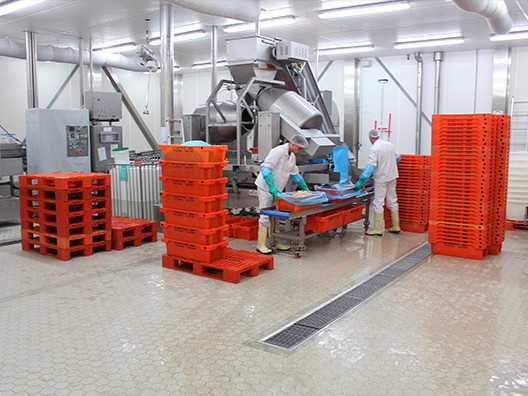
“Can you disinfect a room at the touch of a button? Yes you can!” say Hugo ter Hoeve and Robert Kostrubiec from the Dutch company called Simpel Desinfecteren. They are launching the Nocospray method for the food industry in the Netherlands. “The method has been used successfully in the medical world for years in the form of the liquid Nocolyse, which is approved by the Board for the Authorisation of Plant Protection Products and Biocides (CTGB). Next month the liquid Nocolyse-Food will receive a CTGB N-number.” Leading food processing companies who have tested the method share their experiences here.
'Nocospray approved for the Dutch food industry'
In December 2015 CTGB will be allocating an N-number to the Nocolyse-Food liquid. CTGB is the only institute in the Netherlands that is allowed to award N-numbers to plant protection products, biocides and cleaning and disinfection agents. Cleaning products without an N-number are not permitted for use in the Netherlands.
“Nocospray is a disinfection concept in which an aqueous solution (Nocolyse-Food) can disinfect a room – including all the equipment and other items in it – via a dry vapour,” explains Hugo ter Hoeve. “The Nocospray machine disperses the Nocolyse-Food liquid throughout the room at a speed of 80 metres per second, through a patented nozzle. This creates a dry vapour which produces oxygen radicals, and these react and disinfect in the process. Wherever the oxygen radicals are, they eliminate (pathogenic) microorganisms. Depending on the type of microorganisms, it’s possible to achieve up to a 6-log reduction. Nocospray can be used in rooms measuring up to 20,000m3 and it is 100% corrosion-free. Moreover, the liquid is 100% biodegradable, doesn’t leave any residues and is easy to use.”
The business cases consistently compared the existing method of disinfection with the Nocospray method, focusing on the main question of: ‘Is the Nocospray method at least as effective as the disinfection method currently used by the company?’ The cases also assessed the continuity of the reliability of both methods. Furthermore, it was established whether Nocospray led to savings in terms of labour, cleaning costs and water usage, among other things. A number of respected companies were selected to take part: FEBO Fabriek (snacks) Klaas Puul (shrimps and salmon), Excellent AGF (fresh-cut produce), Bakkerij Deckers (bakery), Nico Sluis Vleeswaren (meat and meat products), Kaandorp Cheese (cheese processing) and Oliva (tapas). At the end of the test period, six of the seven companies expressed a preference for the Nocospray method, and two of them immediately placed an order for it.
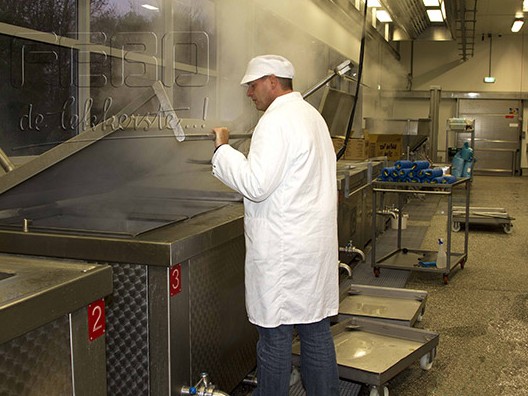
FEBO’s modern factory, located in Amsterdam North, is where snacks are produced for the company’s 67 own fast-food outlets. Quality and food safety are top priorities for FEBO. To test Nocospray, Quality Manager Ferry Stevens first sprayed it in a cold storage chamber used to hold raw chicken. The cold storage chamber had expressly not been disinfected beforehand. After the Nocospray treatment the total bacteria count was measured again. Ferry Stevens reacted enthusiastically when he saw the analysis results: “Amazing! There wasn’t a single germ left.” That was reason enough for him to conduct another test, this time in the re-cool cold storage chamber which had forced chilling (-2-3˚C). This was a challenge for Nocospray because the oxygen radicals struggle to find their way in cold temperatures. On the upside, the condenser creates a strong circulation of (cold) air which makes it easy for the oxygen radicals to move around.
Various surfaces were tested before and after treatment with the Nocospray. The result: a reduction of more than 80%, and the pathogens Listeria and Salmonella that had been introduced for the purpose of the test had completely vanished. In the last test the focus was on the final disinfection of the machines. In practice, these are disassembled, blasted with air, rinsed with water, cleaned with a cleaning and disinfection foam, rinsed again, reassembled and then disinfected once more and rinsed. Nocospray could replace the last two steps in that process. Ferry Stevens: “That would make a huge difference in terms of time and labour, and hence money. Plus it would eliminate the risk of human error; Nocospray’s dry vapour gets literally everywhere.” Ferry Stevens gives Nocospray a score of 8.5.
Excellent AGF has a modern production facility in Tilburg which is ISO 22000 certified. Wil Jansen, from the Houwers Group, is hired in as an expert to safeguard quality. Excellent AGF is continually seeking ways to reduce the risk of contamination within the company. Wil Jansen: “If bacteria can’t get onto a product in the first place, they can’t start multiplying, and hence they can’t contribute to the deterioration process of the products.” The test results showed a significant improvement in the general contamination risk. Wil Jansen: “We selected around ten locations beforehand where the numbers of aerobic bacteria per 10cm2 were measured throughout the trial period. All of the agar samples were immediately assessed by an accredited laboratory (Alcontrol Food BV).”
No changes were made to the regular cleaning activities and the external cleaning company was not informed about the trial.
“The tests have shown that Nocospray is a good addition to our cleaning programme”
By the end of the first weekend it was already apparent that Nocolyse had a significant effect on the presence of microorganisms. Before the spray was used, 50% of the surfaces tested were rated as good or very good; after treatment with Nocolyse that percentage had risen to 100% of the surfaces being rated good or very good. On the Monday morning the same areas were tested once again and the agar samples were sent off for verification. The result was clear: 50% more surfaces scored ‘good to very good’. Using strips that measure the presence of oxygen radicals, it was demonstrated that the oxygen radicals penetrate into all areas of the production kitchen and even right into the heart of the machinery. “The tests have shown that Nocospray is a good addition to Excellent AGF’s cleaning programme. Further analysis must reveal whether it can also help us to make financial gains. Based on just ten hours of cleaning a week it won’t make an earth-shattering difference, but if we can scrap the chlorine component from our cleaning programme that would be a nice step in the right direction towards a more sustainable company that takes people and the planet seriously. The real benefit of this disinfection agent is that it reduces the risk of contamination in the production environment. Another major advantage is that it prevents the growth of mould in the air socks and air cooling systems.”
The production facility of bakery company Bakkerij Deckers is in southern Limburg. The company mainly exports sweet pastries for the German retail market and complies with IFS certification. In all bakeries, there is a microbiological climate which contains a high level of moulds. These can multiply and grow, especially if moisture-rich ingredients are used such as fondant, currants or raisins. Owner Huub Deckers: “When using my current chlorine-based cleaning agents I can’t be sure that my entire bakery facility is mould-free. I can disinfect the conveyors and the machines, but that makes little if any change to the microbiological climate in my bakery – and that’s what I’d really like to achieve.”
The trial was conducted in the packing department at Bakkerij Deckers. Surface samples were taken before and after treatment with Nocospray and the result was a 90% reduction. Huub Deckers: “Based on using Nocospray twice a week I saw a reduction in moulds and bacteria in general. By reducing the risk of contamination, I’m certain that the risk remains at an acceptable level.” Huub Deckers gives Nocospray a score of 8 “because it works”.
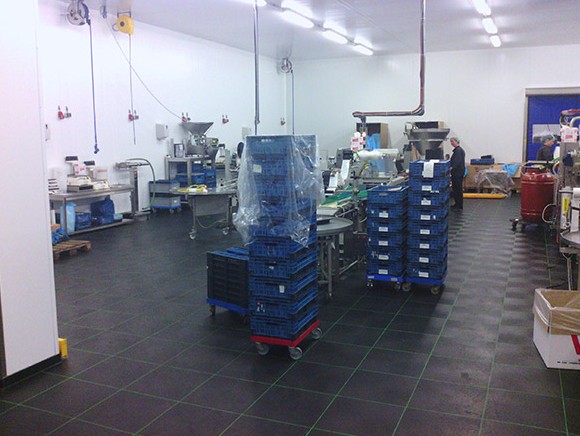
Oliva based in Millingen a/d Rijn supplies many kinds of tapas products, ranging from olives and stuffed peppers to sun-dried tomatoes and humus. The company works with BRC A-level certification. In view of the wide variety of products in its portfolio, hygiene is essential. Owner Ed Fuchten said of Nocospray: “I already know the technique from South Africa, where it works perfectly. I’m very excited that such a system is now also being launched in the Netherlands.” For the purpose of the business case a number of items were consciously not cleaned and disinfected. After use of Nocospray, hardly any bacteria could be found. Ed Fuchten: “The microbiological results can be described as tremendous. The system works perfectly. It provides assurance that the production lines and machines are clean. By using it twice a week we can bring down the risk of contamination in the production areas. It also works excellently against Listeria and Salmonella. I regard it as an effective and easy way of integrating an extra bit of certainty into my business processes as a final disinfection step. I also consider it important that the agent is biodegradable and does not leave behind any residues, so it’s not necessary to rinse the machines and conveyors afterwards.” Score: 8
Focus of the business cases
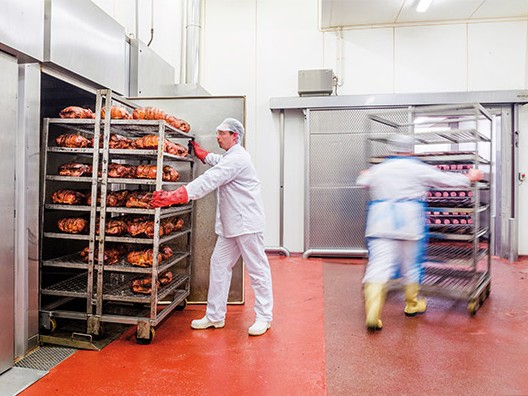
Nico Sluis Vleeswaren’s production facility in Maarssen has BRC A-level certification. Cleaning and disinfection are a top priority at the meat firm. Tests of the surfaces before treatment with Nocospray revealed that the company operates a thorough cleaning and disinfection process. In view of this, the main question when testing Nocospray was: can this method match the current standard of disinfection? For the duration of the trial period, the cutting room was only cleaned rather than being disinfected too. Then Nocospray was used. The results were just as good as with traditional disinfection. Throughout the day, the employees are continually cleaning and disinfecting the 15 production areas. Although he noted how easy it was to use Nocospray, Nico Sluis concluded: “I don’t see Nocospray as having any added value for my company and our way of working. Our cleaning and disinfection activities are already well organised. However, Nocospray is effective so I’ll give it a score of 7.”
Located in Volendam, the Klaas Puul production facility processes shrimps and salmon. Hygiene is a must and the company also complies with IFS Higher Level certification. Quality Manager Kees Tuijp: “After the shrimps have been cooked and re-cooled, they are transferred to the packing department.
Kees Tuijp: “There was not a single germ to be seen”
Nocospray must achieve a sufficient level of disinfection on all the surfaces in the packing area.” This packing area is a square building with two roller doors at the entrance from the cooking line. The building houses the cooling unit from the cooking line, the feed conveyors and the preservation unit. This is where Nocospray was used. Kees Tuijp was surprised by the results from the first swab tests. “There was not a single germ to be seen. I ended up taking a sample from the floor and the drain because all the other surfaces were too clean to show any difference. In view of its effectiveness and ease of use, I give Nocospray a score of 8.5.”
Kaandorp Cheese is involved in the purchase, receipt, storage, processing and packing of cheese. Kaandorp works in line with the FSSC 22000 food safety system. It employs ten people, five of whom work in the packing department. The company sells to retailers, wholesalers and specialised cheese shops in the Netherlands. Ragnhild Visser-Vijfvinkel is the QA Manager. When talking about her expectations of Nocospray, she said: “Making big gains in terms of reducing microbiological growth – quickly and easily.” Kaandorp Cheese was keen to take part in the business case to see whether it could save a significant amount of time in terms of disinfection and could perhaps also substantially reduce microbiological growth.
Ten surface tests were carried out and air samples were also taken from Kaandorp’s packing department, both before and after treatment with Nocospray. The air samples showed a 50% reduction in yeasts/moulds. 90% of the surfaces showed a significantly improved bacteria count, and on 80% of them there were no bacteria at all. Ragnhild Visser-Vijfvinkel: “Nocospray lived up to my expectations. It offers considerable time savings. Furthermore, Nocospray could also be used for the trucks, for example.” Score: 8.5
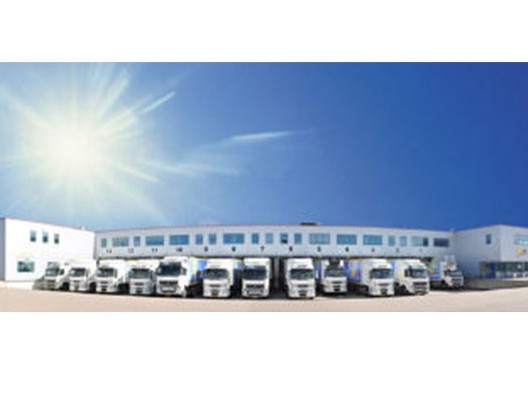
Advantages:
Disadvantages:
Conclusion: for people who wish to reduce the risk of contamination and achieve a more consistent result in combination with a sustainable business approach, Nocospray is an effective solution.
Source: © Simpeldesinfecteren